All rights reserved. Copyright © 2019 Renegade University
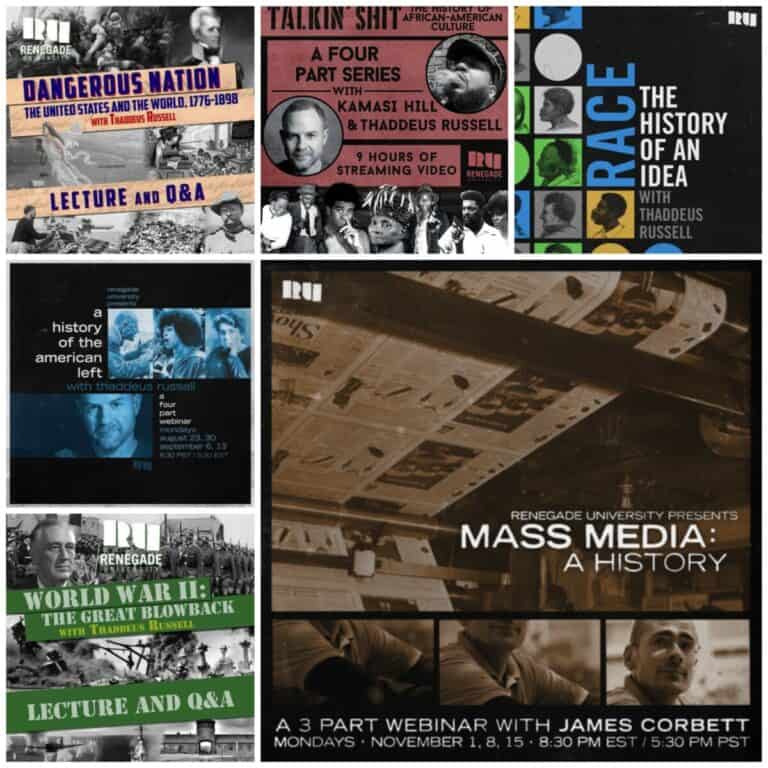
US History Bundle
In the RU US History bundle, you’ll gain insight from historians Thaddeus Russell and Kamasi Hill on the history of race and African-American culture. You’ll gain valuable insight into American foreign policy in the 18th and 19th centuries. You’ll hear Thad’s compelling interpretation of the history of World War II and its consequences. And, finally, you’ll experience James Corbett’s masterful history of the mass media and how it is used by governments to manipulate the masses.
$539.00
Included in This Bundle
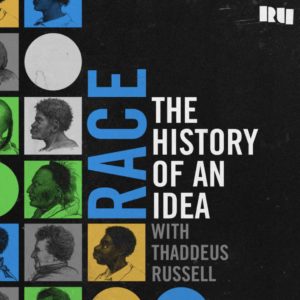
Race: The History of an Idea
In this course, you’ll be guided by Thaddeus Russell in an examination of the origins of the idea of “races” of human beings in the United States. The concept of “race”, largely a fictional concept, was deployed over two centuries in efforts to conquer, exterminate, civilize, and assimilate various “races” of people both inside the U.S. and across the world. This is the history of a concept.
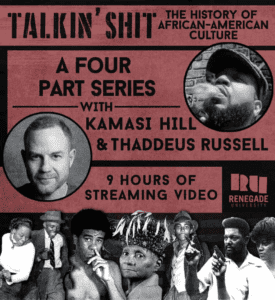
Talkin’ Shit: The History of African-American Culture
This course, co-taught by Kamasi Hill and Thaddeus Russell, examines the origins and ascendancy of the most loved, hated, and powerful popular culture in American history. Over the last two centuries the cultural forms created by American slaves and their descendants have been welcomed and often worshipped in nearly every country in the world. This is a course other universities wouldn’t dare to offer: a politically incorrect, renegade history of black America.
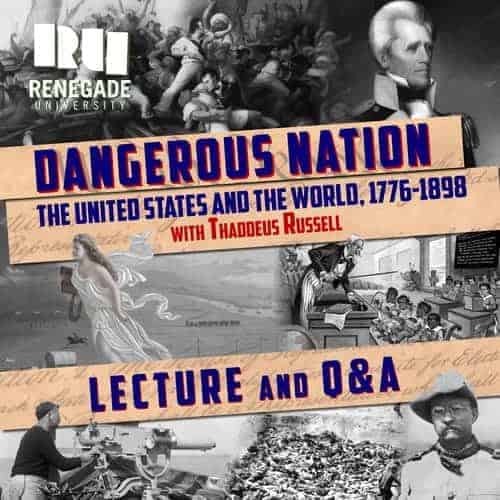
Dangerous Nation: The U.S. & The World, 1776-1898
The United States of America became a globalist empire not with the Spanish-American War in 1898, as most textbooks tell us, but with its founding. The Declaration of Independence asserted that “the People” possessed both a right and a “duty” to overthrow oppressive governments and to “provide New guards for their future security.” This idea famously justified the American War of Independence, but it was also interpreted by subsequent political leaders of the United States as an injunction to forever expand what Thomas Jefferson called the “empire of liberty.”
This course presents an argument that globalist, imperialist ideas were embedded in America’s founding philosophy and that they were carried out in all the military endeavors of the U.S. in the 19th century, from Jefferson’s campaign against the “Mohammedan” pirates of the Mediterranean to Jackson’s crusade to “civilize” the West and Lincoln’s conquest and “reconstruction” of the South.
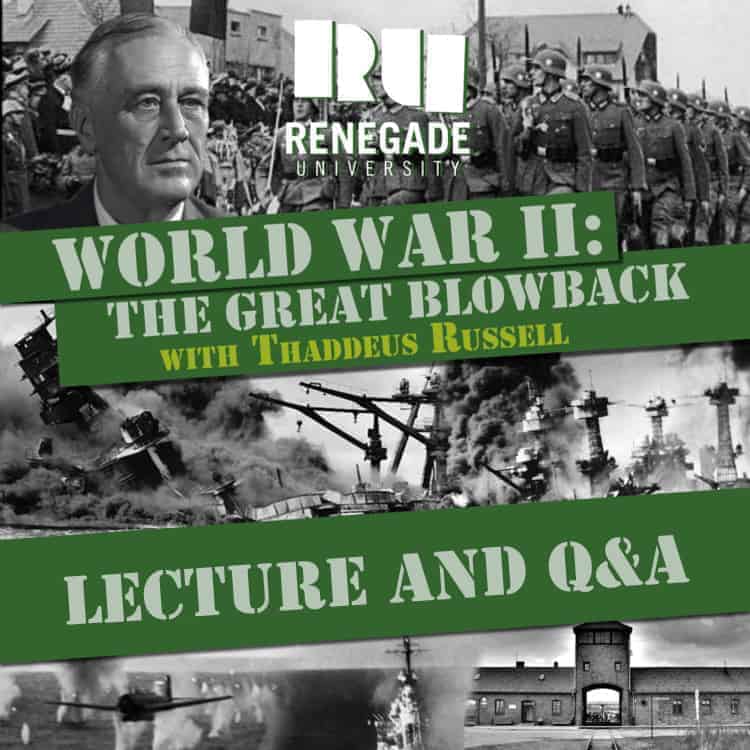
World War II: The Great Blowback
Americans are skeptical of all but one of the foreign wars of the United States. It is widely accepted among both historians and the knowledgeable public that the Spanish-American War, World War I, the Korean War, the Vietnam War, and the Afghanistan and Iraq wars were either colossal “mistakes” or acts of imperialist aggression. The Second World War remains the only “good war.” Indeed, it remains the only sacred war.
In the United States, it is still impossible to call into question the virtue of this country’s participation in the global war of 1939 to 1945 without being dismissed or castigated as a Nazi sympathizer, Holocaust denier, conspiracy theorist, or crank. And yet over the last two decades, academic historians in Europe have begun to assemble recently discovered evidence into a new narrative in which the policies of the United States during Franklin Roosevelt’s presidency are a principal cause not only of the military conflicts in Asia and Europe that killed more than 60 million people but also of the deaths of six million Jews inside the Third Reich.
In this course we will do what very few American historians of World War II know or dare to do. We will examine the emergent, revisionist history and determine whether it is now plausible to argue that America’s “good war” was actually America’s greatest blowback.
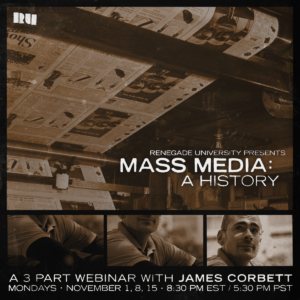
Mass Media: A History
Beginning in the late 19th century and accelerating in the 20th century, a series of technological innovations brought about the age of mass media: national newspapers, radio stations, TV networks, and now websites and social media. These new forms of media have transformed our relation to the world and altered the course of human civilization. This three-part course explores those changes in their historical context, from the development of mass media technologies to the consolidation of the media oligopoly to the fracturing of narratives that has taken place with the rise of the Internet. Together, we will examine how the mass media and the industry that has grown up around it has been engineered to produce certain effects in the population and where these technologies are directing us in the 21st century.
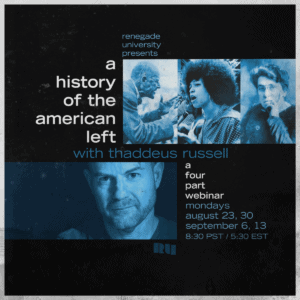
A History of the American Left
This course examines the history of the political and intellectual movement that is now at the heights of American culture. Though the great majority of Americans do not identify as radical or left-wing, what is called “the left” has taken commanding positions in many parts of American society.
Since the 1930s, socialists, communists, and social democrats have controlled many of the major labor unions in the United States, and with that power have continued to exert influence over American electoral politics. Since the 1960s, the left has dominated academia, and few college graduates have not been exposed to the ideas of Marxism, radical feminism, or critical race theory.
We begin the course with an analysis of the intellectual origins of the modern American left, including Rousseau and the French revolution, Marx and “scientific socialism,” Eugene Debs and Christian socialism, “2nd-wave” radical feminism, and the anti-racism of the abolitionist, civil rights, and Black Lives Matter movements.
$539.00
